Real bread movement
The real bread movement started in the UK in 2015 under the influence of the Scottish baker, Andrew Whitley. Europeans make a decent loaf but in Britain and America since the invention of the Chorleywood-process, the commercial offering has become tasteless, fattening and profoundly unsatisfying.
It also has become indigestible causing many people bloating and abdominal pain; and the emergence of gluten-intolerance from a condition that was once rare but is now common.
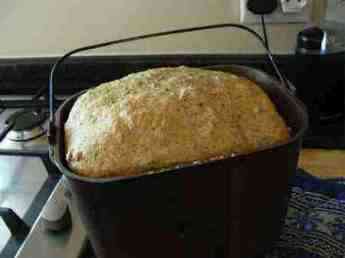
There are two issues at stake.
- Firstly real bread should be baked entirely with natural ingredients and none of the chemicals added to the modern commercial loaf.
- And secondly that it should preferably be made using wholemeal flour; no separation of the three streams.
- Bran
- Germ
- Endosperm
Bread has occupied a central part of our culture for thousands of years yet has latterly for good reasons fallen into disrepute. The staff of life, post-Chorleywood has become the source of very trying irritable bowels; and it's made us fat.
It's become an ultra-processed food stuffed with chemicals; and made with flour from which most of the goodness has been extracted.
In particular it is the addition of transglutaminase that is the spoke in the wheel. It's a chemical that has been fingered as one of the ingredients that is causing abdominal pain; and an increasing prevalence of wheat-intolerance in the general population.
In addition commercial bread is laced with sugar and too much salt in an attempt to compensate for the loss of taste after the extraction of the best parts. Coupled with the influence of the highly-refined flour on blood glucose, many nutritionists have started advising people to eat fewer slices; or even none.
The modern loaf is deemed to be one of the causes of the sharp increase in obesity, type-2 diabetes and cardiovascular disease.
Twenty-years after Americans began eating a diet high in refined carbs, the prevalence of diabetes began to rocket; and continues to do so.
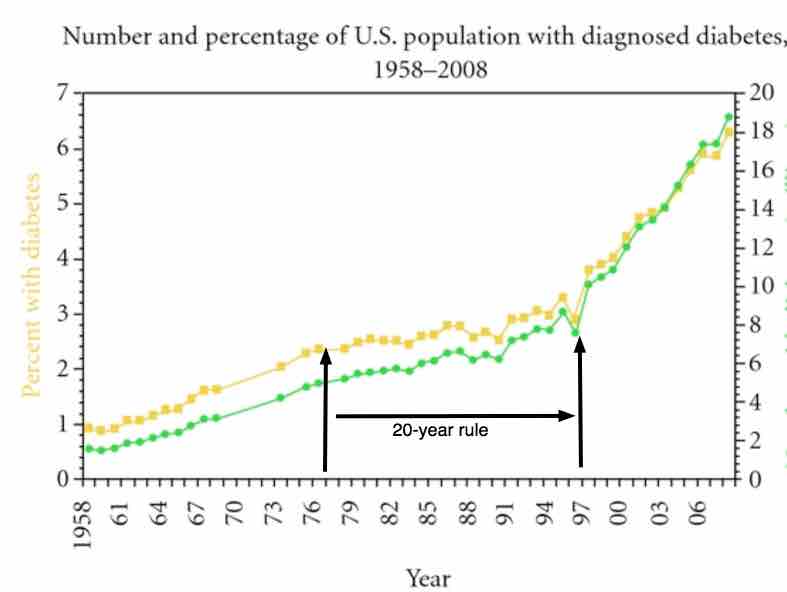
1977 was the year when Americans were told to start eating much less fat and more carbohydrate; that sounded perfectly good in principle but in practice whole grains were and still are very difficult to get. So they turned instead to enjoying highly-refined baked products.
In a hallmark study in South Africa, eminent Dr George Campbell proposed his twenty year diabetes rule; he is ignored but his theory has been profoundly vindicated.
Another unintended consequence is that fat provides satiety. Turning away from butter, eggs and cheese meant that people were constantly hungry; and started eating more sugary and refined baked-goods like bagels. Added to the problem was the use of very large amounts of polyunsaturated oils; that meant angry, painful and inflamed bodies.
The real bread movement cuts right across all this baloney using whole grains and is not afraid of added saturated and omega-3 rich fat.
Old Testament curse
"When I break your staff of bread, you shall eat but not be satisfied."
- paraphrased from Lev 26
The common loaf has become profoundly unsatisfying and worse very unhealthy. Into this environment of negativity the real bread movement was born. Small corner-shop bakers were encouraged and supported to once again produce nutritious, tasty slices that would promote wellbeing; and that the general public actually enjoyed.
Personally I would like to see each bakery having its own mill so that the true wholemeal flour is really fresh.
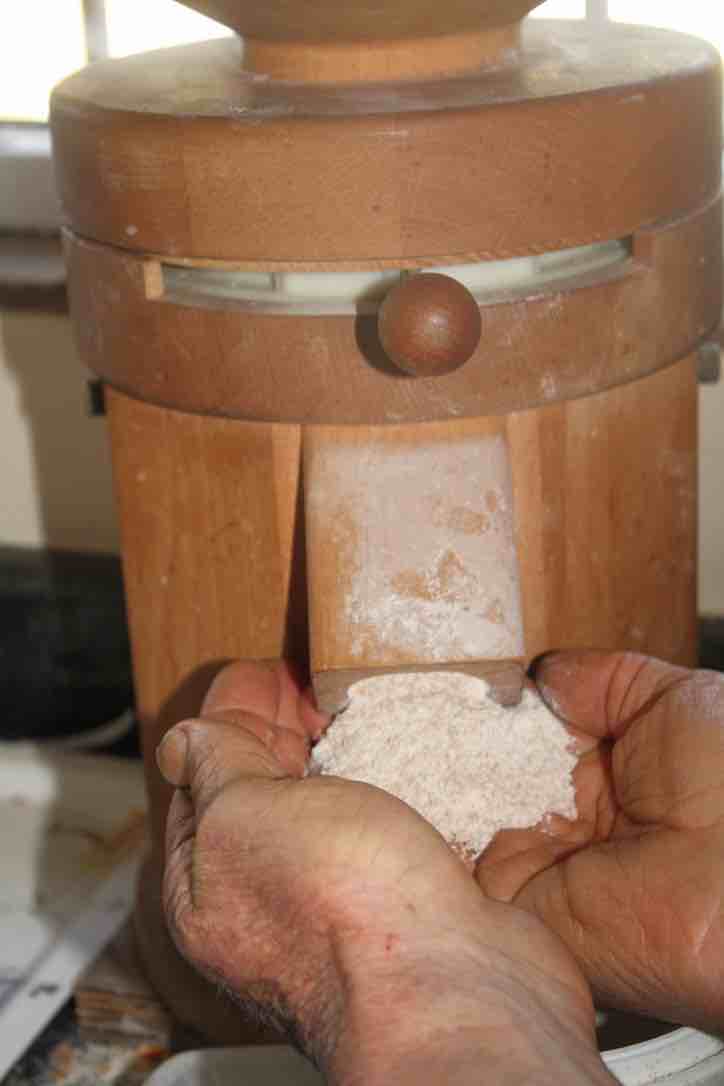
Whole grains
If you read the literature you will find repeatedly that scientists are encouraging us to return to whole-grains, more fruit and vegetables; and less sugar, salt and animal fat. In fact they have found that type 2 diabetes can be completely brought into remission without the use of medication[7] by these simple changes; and a short brisk walk after starchy meals.
The problem of course is that the industry is putting a huge amount of energy into promoting food that is made using refined grains. That's where the profit is; in similar vein, cornflakes costs more than ten times wholesome grits. We have been duped. After an hour we are hungry again.
Whole grains gutted of their nutrients then become tasteless so manufacturers add large amounts of sugar, fat and salt; a triple whammy of poor health.
Unrefined grains are very hard to get; we have become hooked on cookies, cakes and the commercial loaf. Many people have become so accustomed to the industrial diet that they turn up their noses at what the real bread movement is trying to promote; nutritious, tasty slices that will not make us sick.
Educating the public is a fundamental part of the real bread movement. A great deal of energy has to come from the medical profession, departments of health and the media; to unhook the public from the sugar and refined carbs that have robbed us of our wellbeing.
The real bread movement is calling for proper labeling of commercial loaves. Bakers are reluctant to divulge what they are putting into our food; we have little idea what we are eating.
Bringing together the farmers who grow the wheat, the millers who grind it and the bakers who make our daily bread is an essential part of the movement.
Hi Bernie,
All 10 bags are sieved, packed and ready. I will deliver them as soon as things slow down a bit.
Farmer Jones
That is the message that gladdens the heart of every real bread baker. Half a ton of wheat will satisfy not only their own personal needs for unrefined flour but the growing number of people who are buying or making artisanal loaves[2].
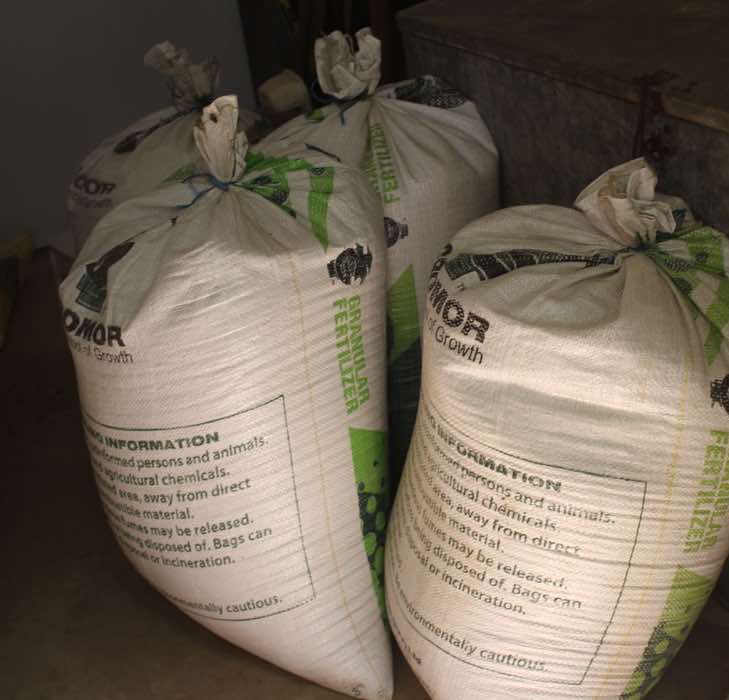 50kg bags direct from the farmer
50kg bags direct from the farmerFirst the grain must be frozen to kill the weevils and then stored in air-tight buckets where it will be safe for a whole year from rodents and moisture. Storing wheat berries is quite a chore but foundational for those wanting to bake for the real bread movement.
And then to produce home bake bread flour one must have a grinder; or access to a local miller who does not separate the three streams that constitute a whole-grain.
The bran is where the fibre and many phytochemicals, for example the lignans[5] are located; and some of the amino acids.
The germ and bran contain some of the protein, most of the nutritious oils and the all-important vitamin E. The endosperm is the starch that in the context of 100pc wholemeal will supply energy to your body but not spike your blood glucose.
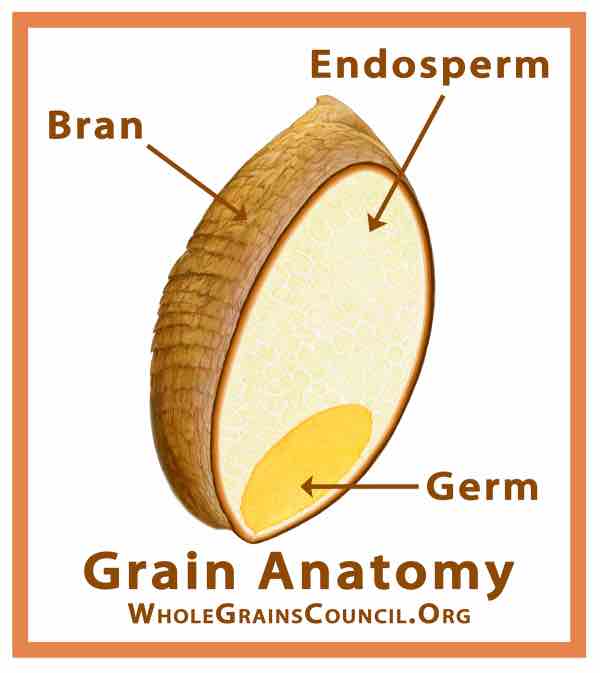
The real bread movement has been for us just one part of what we are calling a Cyan Zone. That means turning our home into a place that cares for both green issues[3], the wellbeing of the planet and in addition too the blue principles [4] of a healthy life. We want to be counted amongst those who have a ten-times greater chance of reaching old age with all our marbles and joints intact.
A massive thanks must go to Andrew Whitley; his tireless determination to bring real bread back to the masses has been profoundly important for our own personal well-being but I think it true to say literally millions of others too.
If you have not read his inspirational book "Bread Matters," buy it; it's a keeper.
Thank you Andrew, you are a star in the firmament.
The Big Fat Lie
"If we can’t distinguish truth from lies and reality from invention, we cannot maintain our value system.
Without a value system, we cannot discern right from wrong; our entire edifice will crumble and not so slowly."
- Branko Brkic
Human health is crumbling; and not so slowly. Millers are allowed by international law to lie about the contents of their flour. They may label it as "wholemeal" provided they do not extract more than 40% of the goodies; the bran and the germ. So we can no longer discern the good from the bad, right from wrong.
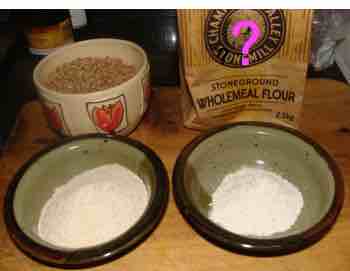 Which of these is true wholemeal?
Which of these is true wholemeal?The germ and bran contain the vitamin E that is nature's own anticoagulant; the lignans that help prevent breast and prostate cancer.
What are the two leading causes of death? Cardiovascular disease and cancer, especially of the prostate and breast of course; and diabetes from refined grains is right up there too. None of this comes as a surprise given today's fake bread.
What are the 3 types of bread?
There are 3 types; those which rise completely that we are all familiar with, others like heavy rye roggenbrood and flat breads that use no yeast.
From a commercial baker all 3 are likely to use highly refined flour; with many chemicals added to speed up the process.
The real bread movement cuts right across all that; a loaf that is tasty, nutritious and will not give us a bellyache. Slices that will not mean a lifetime of dieting; the constant threat of insulin resistance and type-2 diabetes. The bran, extra protein and natural fats supply that feeling of fullness after eating that is known as satiety.
- But one slice of real bread is enough at a sitting.
- Bernie's scientifically proven weight loss program
Real bread movement
The real bread movement started in the United Kingdom. The influence of Scottish baker Andrew Whitley has been simply vast; his book is a gem.
- Real Bread Campaign
- What is artisan bread
- The green journey
- Blue zone longevity
- What are lignans? Web: https://tinyurl.com/2p8hhbpz
- A brief history of the enrichment of flour and bread
- Food as medicine for remission of T2D
When browsing use right click and Open Link in New Tab, or you may get a bad gateway signal.
The material expressed on this page is gleaned from the nutritional and environmental literature; it is clearly referenced. A plain distinction is made between the author's opinion and that which is scientifically proven. When in doubt consult your health professional.
To suggest a correction or clarification, write to Dr Bernard Preston here. Contact.
Newsletter
Our newsletter is entitled "create a cyan zone" at your home, preserving both yourself and Mother Earth for future generations; and the family too, of course. We promise not to spam you with daily emails promoting various products. You may get an occasional nudge to buy one of my books.
Here are the back issues.
- Lifestyle and ideal body weight
- What are ultra-processed foods?
- Investing in long-term health
- Diseases from plastic exposure
- Intensive lifestyle management for obesity has limited value
- A world largely devoid of Parkinson's Disease
- The impact of friendly bacteria in the tum on the prevention of cancer
- There's a hole in the bucket
- Everyone is talking about weight loss drugs
- Pull the sweet tooth
- If you suffer from heartburn plant a susu
- Refined maize meal and stunting
- Should agriculture and industry get priority for water and electricity?
- Nature is calling
- Mill your own flour
- Bake your own sourdough bread
- Microplastics from our water
- Alternative types of water storage
- Wear your clothes out
- Comfort foods
- Create a bee-friendly environment
- Go to bed slightly hungry
- Keep bees
- Blue zone folk are religious
- Reduce plastic waste
- Family is important
- What can go in compost?
- Grow broad beans for longevity
- Harvest and store sunshine
- Blue zone exercise
- Harvest and store your rainwater
- Create a cyan zone at your home
Did you find this page interesting? How about forwarding it to a friendly book or food junkie? Better still, a social media tick would help.
Address:
56 Groenekloof Rd,
Hilton, KZN
South Africa
Website:
https://www.bernard-preston.com